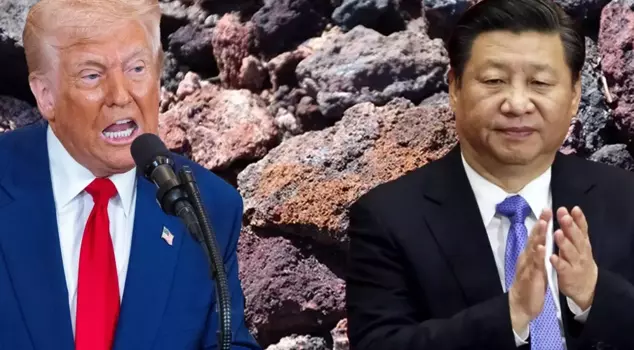
09.04.2025 15:01
China has opened a new front in trade wars by restricting the export of certain rare earth elements, raising questions about how this could impact the global supply of high-tech products.
As the tariff standoffs between the U.S. and its trade partners continue, this situation is causing uncertainties regarding the course of global trade. Following the "reciprocal" tariffs announced by U.S. President Donald Trump, China's restriction on the export of certain rare earth elements in response to the U.S.'s reciprocal tariff increase has intensified the trade wars.
GOVERNMENT PERMISSION REQUIRED FOR RARE EARTH ELEMENTS
The Chinese Ministry of Commerce announced that starting from April 4, seven categories of medium and heavy rare metals, including samarium, gadolinium, terbium, dysprosium, lutetium, scandium, yttrium, and their alloys, will be added to the export control list. In this context, Chinese suppliers will only be able to export these rare earth elements with government permission. Furthermore, Chinese customs officials may seize shipments suspected of containing restricted elements.
GLOBAL CHIP PRODUCTION SUPPLY MAY ALSO BE AFFECTED
The elements in question, of which China provides a significant portion of the global supply, are used in a wide range of products, from weapon systems to high-performance engines, nuclear reactors to electronic and optical equipment, spacecraft to medical imaging machines, and from batteries and fuel cells to semiconductors and superconductors.
China, which holds a significant share in the production of 17 groups of rare earth elements, has once again shown its intention to turn its global dominance in this field into an economic leverage through export restrictions. This move came after U.S. President Donald Trump announced that he would impose an additional 34% customs duty on China under the reciprocal tariff principle.
By restricting the export of certain rare earth elements, China has opened a new front in the trade wars, raising questions about how this could affect the global supply of high-tech products.
Important metals such as samarium, gadolinium, terbium, dysprosium, lutetium, scandium, and yttrium are critical in sectors like defense, electronics, and renewable energy.
While rare metals are critical in sectors such as defense, electronics, and renewable energy, they are also heavily used in mobile phones and electric vehicles. It is anticipated that China's export restrictions on rare earth elements could also disrupt the global chip production supply.
On the other hand, China has stated that it will not back down against President Trump's threat of a 50% additional customs duty and will take determined measures to protect its rights and interests.
"RARE METALS ARE AN IMPORTANT LEVERAGE FOR CHINA"
Asia Markets Specialist Süleyman Mete Özbalaban stated in an evaluation to AA correspondent, "The rare metals in question are a very important issue and really serve as an important leverage for China."
Özbalaban noted that China has started to use rare metals against the U.S., Japan, and EU countries following recent developments, saying, "However, it seems that China wants to use this more as a bargaining chip in negotiations. In other words, it does not want to completely halt exports and further strain relations. In this regard, it is imposing export restrictions on the mentioned rare metals."
"EXCLUDING RUSSIA AND INDIA..."
Özbalaban reported that especially the U.S. and Japan are working hard to find alternative solutions regarding rare metals. He pointed out that China's share in the production of most rare metals exceeds 50%, and continued, "Since the trade wars that have been intensifying since 2018, China has started to use this situation as a weapon against the U.S., Japan, and the EU. Following the U.S. expanding its controls and restrictions in the semiconductor sector against China on December 2, China halted the export of germanium and gallium to the U.S. as of December 3. Meanwhile, a restriction on gallium exports had already been imposed in August 2023. In September, restrictions were placed on antimony exports. As a result, China's antimony exports decreased by 90% in October, and no exports were made to any country except Russia and India."
"THE U.S. HAS STARTED TO REDUCE ITS DEPENDENCY"
Özbalaban indicated that the additional tariffs the Trump administration may impose on China could lead to China using its rare metal weapon more effectively, potentially completely banning the export of these metals to countries outside the U.S. He stated, "The U.S. has already started to reduce its dependency on China for gallium, germanium, and graphite by 2024. In 2023, China's share in U.S. imports was approximately 18% for gallium, 38% for germanium, and around 40% for graphite, while in 2024, it is expected to decrease to about 9% for gallium, 32% for germanium, and 38% for graphite."